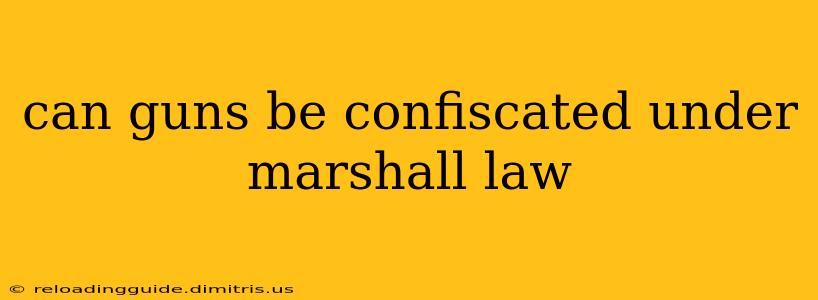The question of whether guns can be confiscated under martial law is complex, sparking heated debates and raising crucial constitutional concerns. The short answer is: it depends. There's no single, universally applicable answer, as it hinges on several factors, including the specific legal framework of the jurisdiction, the nature of the emergency justifying martial law, and the extent of powers granted to the authorities.
Understanding Martial Law
Martial law, a temporary suspension of ordinary law, is implemented in extreme circumstances, such as during war, natural disasters, or widespread civil unrest. Its declaration typically grants the military or other authorized bodies extraordinary powers to maintain order and security. However, the legal basis and scope of these powers vary significantly across countries and even within different states or regions of the same country.
The Constitutional Tightrope: Balancing Security and Rights
The crucial point of contention lies in the potential conflict between the government's need to maintain order during a crisis and the fundamental rights of citizens, including the right to bear arms (where applicable). In countries with strong constitutional protections for gun ownership, such as the United States, the government's authority to confiscate firearms under martial law would be severely restricted. Any such action would likely face intense legal challenges, focusing on:
-
Due Process: The government would need to demonstrate a compelling state interest justifying the confiscation and ensure that citizens are afforded due process, including notice, opportunity to be heard, and the possibility of judicial review.
-
Proportionality: The confiscation must be proportional to the threat. A blanket confiscation of all firearms might be deemed disproportionate if the emergency only justifies confiscating specific types of weapons or weapons from certain individuals.
-
Ex Post Facto Laws: Any law passed during martial law that retroactively criminalizes prior gun ownership would likely be unconstitutional.
Variations Across Jurisdictions
The legal landscape concerning gun confiscation under martial law differs drastically depending on the country and its legal system.
United States: A Patchwork of Laws and Interpretations
In the United States, the Second Amendment of the Constitution guarantees the right to keep and bear arms. However, this right is not absolute and is subject to reasonable restrictions. The extent to which martial law allows for the suspension of this right is debated heavily. State laws also vary significantly concerning gun control, further complicating the issue. Supreme Court precedents have established that the government's power to restrict gun rights under extraordinary circumstances must be narrowly tailored and demonstrably justified.
Other Countries: Diverse Approaches
Many other countries have different constitutional frameworks and legal traditions related to gun ownership and martial law. Some might have stricter gun control laws, making confiscation under martial law less controversial, while others may have more permissive laws, leading to greater challenges and legal complexities.
The Practicalities of Confiscation
Even if the legal basis for confiscation exists, the practicalities pose significant hurdles. Large-scale gun confiscation requires extensive resources, logistical planning, and enforcement capabilities. Resistance from citizens, either through legal challenges or active opposition, is also a possibility.
Conclusion: A Case-by-Case Analysis
Determining whether guns can be confiscated under martial law necessitates a meticulous analysis of the specific legal framework, the gravity of the emergency, and the proportionality of the government's response. While the possibility exists in some jurisdictions, it's vital to underscore the significant constitutional and practical challenges associated with such actions. The outcome invariably depends on the specific circumstances and subsequent legal challenges. This underscores the importance of a well-defined legal framework that balances public safety with the protection of individual rights.

